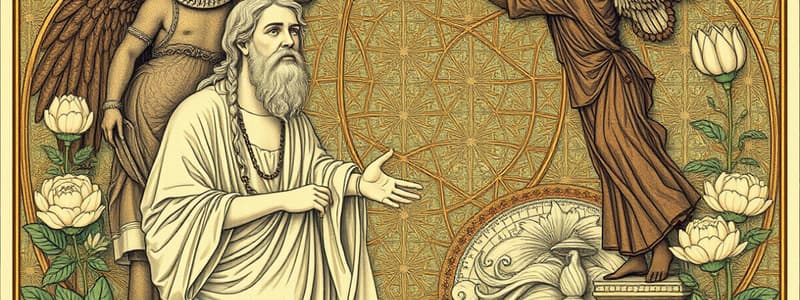Podcast
Questions and Answers
Believed humankind is created in the image and likeness of ___
Believed humankind is created in the image and likeness of ___
God
Self-knowledge is a consequence of knowledge of ___.
Self-knowledge is a consequence of knowledge of ___.
God
The human mind at birth is tabula rasa or ___ slate.
The human mind at birth is tabula rasa or ___ slate.
blank
The self is consciousness according to ___ .
The self is consciousness according to ___ .
According to David Hume, 'There is no ___.
According to David Hume, 'There is no ___.
The idea of personal identity is a result of ___.
The idea of personal identity is a result of ___.
According to Immanuel Kant, 'We construct the ___.
According to Immanuel Kant, 'We construct the ___.
Gilbert Ryle stated that the self is the way people ___.
Gilbert Ryle stated that the self is the way people ___.
Socrates stated, 'An unexamined life is not worth living,' emphasizing the importance of ______.
Socrates stated, 'An unexamined life is not worth living,' emphasizing the importance of ______.
According to Socrates, every person is ______, composed of body and soul.
According to Socrates, every person is ______, composed of body and soul.
Socrates believed the body is ______ and impermanent.
Socrates believed the body is ______ and impermanent.
Plato believed that genuine happiness can only be achieved when the Rational is in control of the ______ and Appetites.
Plato believed that genuine happiness can only be achieved when the Rational is in control of the ______ and Appetites.
Aristotle viewed the body and soul as not two separate elements but as ______.
Aristotle viewed the body and soul as not two separate elements but as ______.
According to Augustine, the soul is united with the body so that man may be ______ and complete.
According to Augustine, the soul is united with the body so that man may be ______ and complete.
Plato's philosophy revolves around the process of self-knowledge and purification of the ______.
Plato's philosophy revolves around the process of self-knowledge and purification of the ______.
Socrates focused on the full power of ______ to understand human self.
Socrates focused on the full power of ______ to understand human self.
Flashcards are hidden until you start studying
Study Notes
What is Philosophy?
- Philosophy explores fundamental questions of existence, knowledge, and morality.
- It involves critical thinking, analysis, and systematic approaches to understand human experience and reality.
Ancient Greek Philosophers
- Ancient Greek philosophers laid the groundwork for Western philosophical thought, significantly exploring concepts of the self and existence.
Socrates (Know Thyself)
- Famous for the quote, "An unexamined life is not worth living."
- Proposed a dualistic view of humanity: body (imperfect, transient) and soul (perfect, eternal).
- Emphasized the importance of reason for self-discovery, virtue, and happiness.
- Asserted that a meaningful life arises from knowledge of oneself through constant soul-searching.
Plato (The Soul is Immortal)
- A student of Socrates, he built on his ideas with a notion of self-knowledge and soul purification.
- Advocated that the mind and soul are inherently perfect, created by God.
- Suggested genuine happiness is achieved when rational thinking governs one's spirit and desires.
Aristotle (The Soul is the Essence of the Self)
- A student of Plato, challenging the dualism concept; viewed body and soul as unified.
- Described the soul as the Form of the body, inseparable from it.
- Promoted the idea of various kinds of souls defining different living beings.
Other Philosophers
St. Augustine
- Merged Platonic ideas with Christian thought, emphasizing the soul's connection to the body.
- Believed humankind reflects God's image, inherently inclined toward goodness.
- Suggested self-knowledge arises from understanding one's relationship with God.
Rene Descartes
- Famous for the phrase "I think, therefore, I am," asserting self-awareness as proof of existence.
- Distinguished between two entities: the mind (thinking) and the body (extension in space).
John Locke
- Proposed "The self is consciousness," introducing the idea of the mind as a tabula rasa (blank slate) at birth.
- Argued that personal identity develops through sensory experiences over time.
- Emphasized consciousness as essential for maintaining a coherent self-identity.
David Hume
- Questioned the notion of a permanent self, claiming "There is no self."
- Described the self as a collection of rapidly changing perceptions, created by imagination.
Immanuel Kant
- Claimed "We construct the self," suggesting that selfhood is tied to knowledge acquisition.
- Believed that rationality allows the self to transcend sensory experience and create a coherent reality.
Gilbert Ryle
- Put forth the idea "The self is the way people behave."
- Argued that the self cannot be analyzed as a separate entity but is instead the aggregate of observable behaviors.
Studying That Suits You
Use AI to generate personalized quizzes and flashcards to suit your learning preferences.



